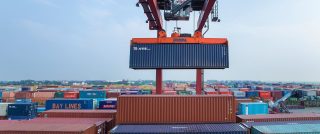With the growth of the global supply chain, warehouses are constantly under pressure for better, faster, more efficient performance. As this pressure grows, the role of lean warehouse management becomes increasingly relevant. However, since lean is relatively new to the warehousing industry, many of us may not be acquainted with it yet. So, given below is an insight to this new concept, and why it is an extremely important subject for the warehousing people.
Warehousing’s historical core responsibility has been the storage of goods. However, the scope and core responsibilities of warehouse management operations have evolved to deliver high level inventory management, swift receiving and shipping dock management, accurate and flexible customised pick & pack services, and state of the art storing and safekeeping solutions for all goods.
This change in the role of warehousing has exhorted leading 3PL service providers like Allcargo Group to bring in best practices that enable them to meet their customers’ strategic delivery needs by improving materials flow, order pick & pack, replenishment, dock operations and maintenance of a swift information flow from source to delivery point, thus facilitating the coordination of the entire supply chain to get purchased materials in the right way, to the right place, and in the exact time they are expected by the next link in the supply chain, right up to and including the final consumer.
Because of the development of an increasingly integrated global economy market with production facilities scattered around the globe, warehouse operations are becoming a key factor to cope with demand variations, and inventory management is a critical component of a company’s financial performance. Smart warehousing has become a vital cog within supply chains because it holds so much potential for improving lead time and cost reductions.
What is Lean?
The lean way of thinking was developed by Toyota for automotive manufacturing.Since their operations include processes, such as receiving, put-away, picking & packing, and dispatch, etc., the lean methodology is also being applied to warehousing. In the context of warehousing, the idea is to eliminate those processes and activities that are absorbing resources but are not creating any additional value. This is done by applying the 5S system of lean, which are Sort, Straighten, Shine, Standardize, and Sustain, to the processes and procedures of the warehouse. The need for the lean methodology in warehouses can be best understood in the context of the challenges that warehouse managers face every day. Here are a few of the major ones:
- Reducing operational costs
- Coping with the pressure of shorter lead times
- Increasing the number of perfect orders
- Meeting the target of same-day/next-day deliveries
- High attrition rates and rising cost of labor
- Managing multiple delivery channels
- Managing an increasing number of SKUs
- Shortage of space
- Seasonal/fluctuating demands
And these are only a few challenges that crop up in the face of the rising prospects of commerce. Here is where lean can help. While on a broad level, lean will lead to better efficiency, reduced errors, and maximum asset optimization, here are a few specific goals that lean can help achieve:
- Standardizing workflow, resulting in shorter order processing time
- Optimizing asset utilization by finding the right place for the right inventory/equipment
- Eliminating inefficiency in material handling, thus reducing labor and transportation costs
- Stocking as per demand, thus enabling easy tackling of seasonal demand
- Cutting time wastage, thus helping you achieve a higher rate of perfect orders and same-day/next-day deliveries
- Standardized processes that make it easy to manage and assess multiple SKUs
- Better human resource management leading to lower attrition rates
- Making way for new ideas and innovation, thus bringing constant improvement
As warehouse digitalization becomes more promising and traditional warehouses are disrupted, lean warehouse management lends itself as a simple yet effective way to attain transformation and competitive advantage. It also means that you can tap technology to improve your lean warehouse, since digitization is also all about simplifying and making processes more efficient.
V. Raju is a logistics and supply chain veteran who is currently the Senior Vice President – CL – Chemical, Pharma & Food Sector, at Allcargo’s contract logistics division.














